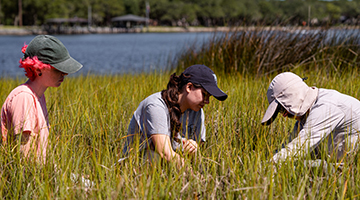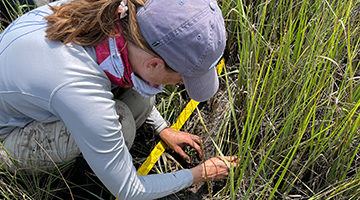Collaborative salt marsh research championed by UNF and global scientists
 Dr. Scott F. Jones, University of North Florida assistant professor of biology, co-led recently published research from an international team of scientists that offers a united, conceptual framework for approaching salt marsh studies. The project aims to encourage cross-disciplinary and global collaborations, ultimately dramatically improving understanding of salt marsh ecosystem functions by appropriately framing the science.
Dr. Scott F. Jones, University of North Florida assistant professor of biology, co-led recently published research from an international team of scientists that offers a united, conceptual framework for approaching salt marsh studies. The project aims to encourage cross-disciplinary and global collaborations, ultimately dramatically improving understanding of salt marsh ecosystem functions by appropriately framing the science.
Salt marshes link land and sea throughout the world and are essential for protecting coastal communities from the devastating impacts of storm surge, reducing nitrogen and storing carbon to help slow the effects of climate change and serving as critical habitat for many varieties of fish and plant life.
 These transitional ecosystems are varied and unique but are often studied as if all salt marshes were identical. This project united global scientists to draft a conceptual framework that allows comparison of salt marshes in a more rigorous and equitable way.
These transitional ecosystems are varied and unique but are often studied as if all salt marshes were identical. This project united global scientists to draft a conceptual framework that allows comparison of salt marshes in a more rigorous and equitable way.
Jones’ fellow co-leads on the project, biologists Drs. Erik S. Yando, Old Dominion University, and W. Ryan James, Florida International University, conceptualized the paper over the course of several years. The team synthesized a wealth of experience in collaboration with international co-authors from Argentina, United Kingdom, South Africa, China, Saudi Arabia, Australia and Russia.
Their work reviews ecosystem-relevant drivers from global to local spatial scales, integrates these multi-scale settings into a framework and provides guidance on applying the framework using specific variables on 11 global examples of salt marshes. The conceptual framework allows for appropriate comparison of study sites by accounting for the uniqueness of each individual salt marsh.
Read “An integrative salt marsh conceptual framework for global comparisons” in Limnology & Oceanography Letters.
